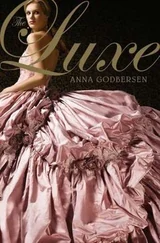“Back when I drove him everywhere and we would talk”—Will was saying each word carefully, and his speech was terse, as it always was when he had thought something through several times—“he would tell me about the places he had been. He told me about many places that I might want to see, but this was the one he told me to find if I wanted to get rich. He described it exactly. He said that it would be—”
“Oh, Will.” Elizabeth felt something like cold in the wind at the bare spot on the back of her neck, just below where her hair rose. “Father said lots of pretty things, but he was a dreamer. You know that.”
Will continued looking in the direction of the cabin and didn’t say anything.
“I just don’t want you to hope for something so wild. I was reading in the paper just this morning how difficult it is to find oil, how many men came out from Pennsylvania and fell flat. And those were the ones with experience. They couldn’t compete against the big companies; they’re the only ones who succeed.”
“I’m going to give you just as good a life as the one you gave up.” He turned to look at her and then rested his large hand on the curve at the base of her neck. “It was your father who told me how.”
Elizabeth never wanted to kiss Will so much as at moments like these. “Oh, I don’t need money, Will,” she whispered. Then she moved into his warm body and kissed him again.
Later, when they walked back as wrapped up in each other as was possible while still moving forward, she again felt perfectly content. The contented feeling was so overpowering that for a moment she even stopped wondering if that last thing she’d said, about not needing money, could really be true.
DEAR LADIES’ STYLE MONTHLY: Could you please give me the answer to a question of great concern? What is the proper mourning period for a young person who has lost their betrothed? The etiquette books are undecided on this sad but pressing subject.
DEAR READER: You are not alone in wondering, as a very prominent case like the one you describe is now occupying many in society. While the loss of a fiancée is a grave occurrence, we must remember that engaged couples are not yet man and wife, nor are they technically relatives. And of course, gentlemen in general must observe a shorter mourning period than ladies. So while a respectful, private period of mourning is essential, two months will perfectly suffice.
— LADIES’ STYLE MONTHLY, DECEMBER 1899
HENRY SCHOONMAKER STOOD AT THE INTERSECTION of two pinched little streets in the old part of town and wondered how soon he could reasonably escape from his father’s parade. The carriage from which Penelope Hayes had winked at him had disappeared — it had been heading in the direction of the East River, though its final destination was almost certainly Fifth Avenue, where she lived. Henry’s family lived along that string of stocky mansions as well, although their arrival, on the Avenue and in New York society, predated the Hayeses’ by many years. But that hardly seemed to matter now. No one particularly cared anymore from where, or when, the Hayeses had come. Penelope had even been able to absent herself from the parade early while maintaining the appearance of some saintly champion of the poor. She was clever — Henry had to admire her for that.
“What a fine young lady Miss Hayes is turning out to be,” Henry’s father, William Sackhouse Schoonmaker, said as he proceeded through the intersection. Henry watched from behind as his father strode purposefully across the bricked street. “It was so good of her to partake in our little charity, and to stay as long as she did.”
“And you know how she must tire so,” his wife, Isabelle, put in. At twenty-five, she was only five years older than Henry himself, and she spoke in a high, girlish voice that made her sound perennially giddy. She wore an ocelot coat and a hat that was top-heavy with silk roses and stuffed sparrows, and even with a firm grasp on her husband’s arm she still managed to bounce as she walked. “As all ladies do.”
“Young Miss Hayes was changed forever, as we all were,” Mr. Schoonmaker went on, to the New York World reporter who had been trailing along at his other elbow and dutifully writing down his thoughts all afternoon, “by the loss of Miss Holland. You see how transformed my son is.”
Both men turned to look at Henry, who was following a few paces behind. He wore a top hat and a black knee-length coat that fit his slim frame well. For while the death of Elizabeth Holland had indeed taken a profound toll on his previously carefree attitude toward life, he had not been so truly transformed as to have given up caring what he wore.
“You see,” he heard his father say as he looked away from his son. “He is inconsolable. The current mayor’s handling of Elizabeth’s death is of course chief among the reasons I intend to challenge him.”
The elder Schoonmaker went on, but Henry had heard the speech many times before. His father had recently decided, despite his enormous personal wealth and the power it afforded him, that he wanted to play in politics as well. His desire to be mayor of a recently consolidated New York City was one of the reasons that Henry had been compelled to enter into an engagement with Elizabeth Holland in the first place, and it was thus also one of the reasons that she had come to such a tragic end. For Henry had seen his fiancée on the last day of her life, and the image of her — alone and frightened in the middle of a Manhattan sidewalk — had been simple enough to interpret.
She had stood there for a few moments looking into him. They had been engaged only a few weeks at the time and, under pressure from their families, they were to be married in a matter of days. Henry’s behavior during that period was not something he looked back on proudly, although it was one of the few times in his life that he had been completely honest with a girl. Just not the girl he happened to be engaged to. He was not proud, either, of his behavior in the years leading up to his engagement, which had earned him a not undeserved reputation as a cad. Still, he could not bring himself to entirely renounce his behavior the night before he saw Elizabeth on that street corner — the night before she drowned. For that was the night that he had invited her younger sister, Di, to the Schoonmaker greenhouse. It had been, for him, an uncharacteristically chaste night; she had stayed up whispering to him and kissing him with a sweetness and innocence that could not possibly have survived what happened next. Elizabeth had seen Henry and Diana together the following morning, and he knew from her clear-eyed gaze that she understood what had occurred. That knowledge must have driven her to her death — one did not just fall into the river and never return. Henry could not deny that devastating fact.
But Henry did not blame himself alone. He blamed his father, too, which was one of the reasons he could not stomach W. S. Schoonmaker’s talking again of Elizabeth as though she were a martyr to his own political cause. He turned and walked back through the marching band that followed in the parade. Above him were tenements, some of them owned by his father’s company, with their unimaginative façades and ersatz Italianate ornamentation. Those little plaster flourishes, which were always crumbling, depressed Henry beyond reason. He caught an elbow against a trombone, causing a small collision of musicians, and heard the music quaver for a moment. The band must have known who was signing their paychecks, however, and there was not even a mutter of complaint. They were after all wearing uniforms in the Schoonmaker colors of sky blue and gold.
Henry kept on, through the band, with all its ear-shattering horns, through the clutch of ladies that followed, in their white gloves and weighty hats. He heard the ladies saying his name and knew that they had turned to look at the spectacle of the young man moving downtown, against the traffic of his own father’s event. He would hear about it later, of course. His father was fond of threatening to disown him if he did not behave as a future mayor’s son should, although these threats had mostly abated since his father had realized that he might plausibly base his campaign on the current mayor’s mishandling of a debutante’s death and the spectacle of his own son’s grief.
Читать дальше












